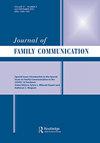Conflict Handling in Ghanaian In-law Relationships: Implications for Face Concerns
IF 1.8
Q2 COMMUNICATION
引用次数: 4
Abstract
ABSTRACT We interviewed 34 married individuals between the ages of 32 and 69 in Southern Ghana regarding conflict handling strategies they adopt in their in-law relationships. We conceptualized the strategies around face concerns. Findings from inductive thematic analysis support participant use of five main conflict handling strategies: human/divine third-party engagements, obsequious behavior, apologizing, ignoring, and confronting. These strategies map onto considerations for other-face concerns as well as mutual face concerns. Findings offer insights about conflict, face concerns, and in-law relationships within a previously understudied cultural context.加纳法律关系中的冲突处理:对面子问题的启示
摘要:我们采访了34位32岁至69岁的加纳南部已婚人士,了解他们在姻亲关系中采取的冲突处理策略。我们围绕面部问题对策略进行了概念化。归纳主题分析的结果支持参与者使用五种主要的冲突处理策略:人类/神圣的第三方参与、谄媚行为、道歉、忽视和对抗。这些策略映射到对其他面孔问题以及相互面孔问题的考虑。研究结果提供了在以前未被充分研究的文化背景下对冲突、面对问题和姻亲关系的见解。
本文章由计算机程序翻译,如有差异,请以英文原文为准。
求助全文
约1分钟内获得全文
求助全文

 求助内容:
求助内容: 应助结果提醒方式:
应助结果提醒方式:


